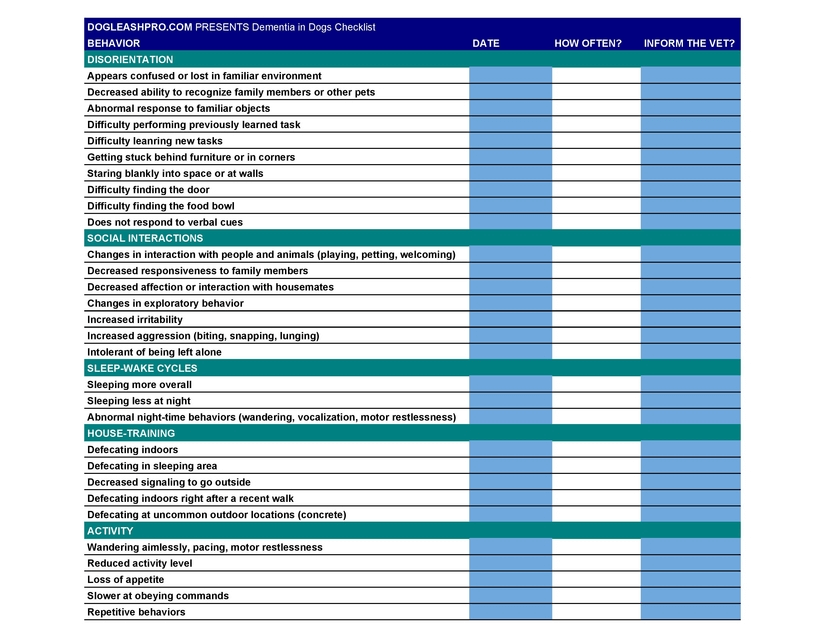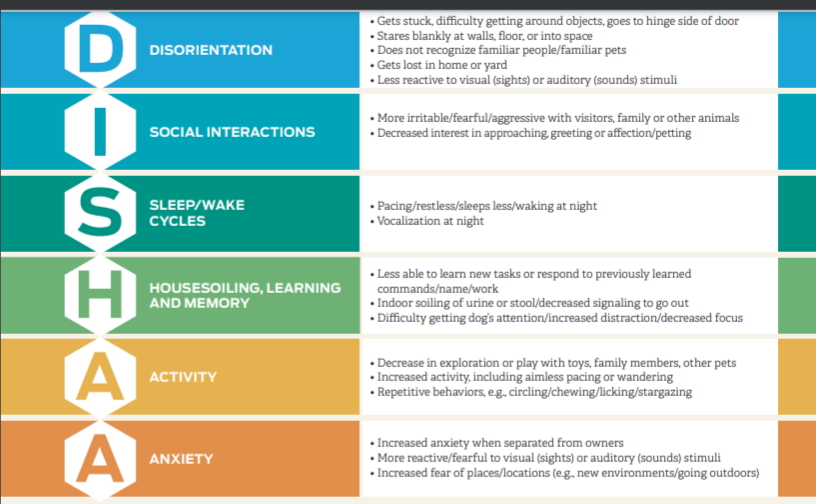
Dogs have so many resemblances with humans; one of them is developing age-related disorders. Just like humans, canines suffer from dementia. When witnessing symptoms of cognitive decline, a common question most pet owners have is, does my dog have dementia?
It generally affects dogs after the age of 8 and the symptoms can put you and your pet in distress. If diagnosed early, the degenerative process can be slowed down but most dog owners are not aware of the dysfunction until it is too late.

If your pup has dementia, you might have noticed several changes in its behavior which are signs you must look out for.
In this post, we present a quiz that should help you confirm if your beloved pooch is suffering from dementia. We also talk about using a canine dementia scale for the diagnosis of the disorder and assessment of the progression of the dysfunction.
Does My Dog Have Dementia Quiz – UPDATED 2022
Dementia is a disorder of the mind and behavior in dogs and brings several changes in their daily activities.
The ‘Does My Dog Have Dementia’ Quiz should help pet owners who observe symptoms of this behavioral disorder.
Here are some questions you can try answering about your furry friend to find out if it is affected by dementia.
- Do you see general anxiety in the pup’s behavior?
- Does the dog show sleep disturbances?
- Do you see repeated behavior like pacing?
- Does the pup show inappropriate vocalization such as whining or howling?
- Does the canine keep staring at the walls?
- Do you see any disorientation in your pup?
- Does the dog fear interacting?
- Is the pup’s sleep cycle disturbed?
- Does this happen – you keep some snacks for the pup to eat and it forgets to eat?
- Does it fail to recognize familiar people or objects?
If the answer to most of these questions is YES, it means your furry friend shows symptoms of dementia and should see a vet to confirm it. The veterinarian rules out the conditions based on the signs and symptoms the pup shows to diagnose dementia and suggests the best treatment method.
Dementia is a progressive disorder with no absolute way to cure it. Treatment of canine dementia includes managing symptoms to make the dog’s life easier.
The vet may prescribe different medications to ease the symptoms the pup is suffering from. It is also recommended to supplement the canine’s diet with foods rich in antioxidants to reduce the symptoms associated with dementia.
Canine Dementia Scale – A Complete Guide
One of the most useful tools for the diagnosis of canine cognitive dysfunction syndrome and evaluation of the effectiveness of the treatment plan is a dementia scale. CADES is a strategically validated rating scale for dogs that contains 17 items across four categories namely sleep/wake cycles, house soiling, social interactions, and spatial orientation.
The rating scale is easy and quick to use and can be applied to any pet at every stage of the disease. The scale helps assess how severe and progressive the dog’s dementia is and how it responds to the therapies and treatment methods.

The scale is based on a number of stages of cognitive dysfunction from mild to severe. Pups with severe cognitive dysfunction show impairment across all four areas.
The Canine Dementia Scale is a validated screening tool for cognitive dysfunction syndrome in canines and should help dog owners trying to find out whether their pet is affected by dementia. It should also help vets identify the severity of the condition and devise a proper treatment plan to improve the pup’s quality of life.
Purina Cognitive Dysfunction Questionnaire
Purina Institute has developed a powerful evaluation tool that helps pet owners identify the behaviors indicative of cognitive dysfunction syndrome.
The tool is called DISHAA and it aims to enable dog owners and veterinarians to work together to assess the dog’s cognitive condition and abilities and the presence and progression of dementia.

The questionnaire consists of a canine cognitive assessment across several areas of dog behavior. Owners can answer the questions depending on the changes they have noticed in their pet’s behavior and signs of cognitive dysfunction.
DISHAA assesses the behavioral changes across categories:
- Disorientation
- Interactions
- Sleep/Wake Cycles
- House-soiling
- Activity
- Anxiety
through specific behaviors under each category rated on a scale of 0 to 3 where 0 is none and 3 is severe.

A score of 4-15 on the scale should indicate a consistent behavior of the canine while 16-33 is moderate. Dogs that show a score of over 33 are likely to have severe cognitive dysfunction and possible dementia.
The score can be taken to a vet who determines the exact cause of the signs of cognitive dysfunction through a physical examination and tests.
Canine Cognitive Dysfunction Supplements
While there is no permanent cure for canine dementia and cognitive dysfunction, there are some ways to slow down the progression of the disease and improve the pet’s quality of life.
Your vet may prescribe a few medicines to help the pup deal with the symptoms of dementia. Some vets even recommend fortifying the pet’s diet with nutritional supplements to support its cognitive function and improve symptoms.
These supplements generally consist of essential nutrients, vitamins, and antioxidants that show noticeable improvements in behaviors associated with cognitive dysfunction within 6-12 weeks.
Final Thoughts
Seeing your beloved four-legged friend suffering from cognitive dysfunction is disheartening and concerning. However, diagnosing the condition in its early stages helps slow down its progression and ease the symptoms.
If you suspect your pup shows any signs or symptoms of dementia, take this quiz and use the dementia rating scale to identify the severity of the disorder and track the improvement in symptoms over time.